Adolescence
The period of life, when the body undergoes changes, leading to reproductive maturity, is called adolescence. This is the time span in which the child develops into an adult.
- Adolescence begins around the age of 11 and goes on until 18 or 19 years of age.
- Adolescents are also called ‘teenagers’.
- The body at this stage undergoes important changes, and these mark the period of puberty.
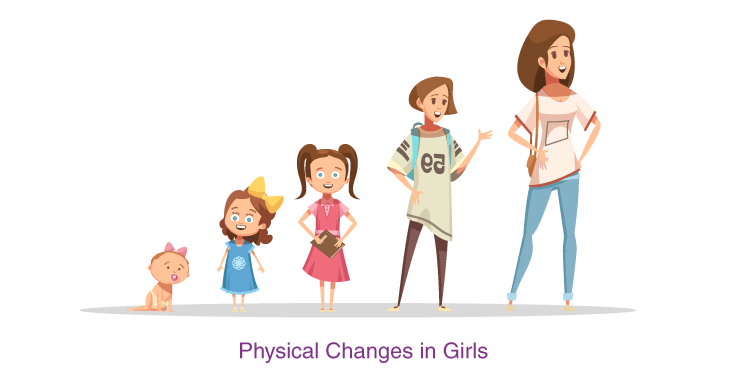
Puberty
Puberty is the period, during which, the human body undergoes certain changes in their body and reproductive organs which leads to sexual maturity.
- The most important change, which marks puberty, is that boys and girls become capable of reproduction.
- In girls, puberty may begin a year or two earlier than in boys.
Changes at Puberty
- An individual goes through different changes during the onset of puberty.
- It differs in males and females. Also, the extent of these changes is different for each person.
- Each individual goes through changes like an increase in height, change in body shape, change in voice, development of sex organs, and mental, intellectual and emotional maturity.
Secondary sexual characteristics
These are external, visible characteristics that develop in boys and girls after puberty, help to distinguish the two sexes and are not directly involved in reproduction. A few of them are as follows.
Boys:
- The growth of facial hair.
- The growth of body hair, including underarm, abdomen, chest hair and pubic hair.
- Chest and shoulders widen, and the body becomes muscular
- Skin becomes more rough and porous, and secretion of sweat glands and sebaceous glands increase
- Larynx (Adam’s apple)/voice box protrudes out, and the voice becomes deep and husk.
Girls:
- Enlargement of breasts
- The growth of body hair prominently in the underarm and pubic areas.
- Widening of hips
- Changed fat distribution. More fat below the skin, at hips, buttocks and thighs.
- Development of secondary reproductive organs.
Mental and Physical Changes at Puberty
Reproductive health
- The physical and mental well-being of an individual is regarded as an individual’s health.
- During adolescence, the reproductive organs develop and become functional.
- Reproductive health means proper growth and well-being of the reproductive organs.
Our Great Glands
Endocrine glands
An endocrine system is a group of ductless glands that regulate body processes and functioning of many systems by secreting chemical substances called hormones.
- They release their secretions directly into the bloodstream.
- The origin and site of action are usually distant for hormones.
Hormones
Hormones are chemical messengers secreted by the endocrine glands.
- They control body functioning, physiology and behaviour.
Pituitary gland
- The pituitary gland is situated in the brain and is called a master endocrine gland.
- It produces hormones that instruct other glands to secrete their hormones.
- The pituitary gland secretes growth hormone, which controls the overall growth of a person.
- Secretion of growth hormone is maximum in adolescence period.
Testosterone
- Testosterone is the primary male sex hormone.
- It is responsible for the development of the male reproductive organs, production of male gamete i.e. sperms and development of secondary sexual characteristics too.
- Testes start secreting testosterone only after puberty.
Oestrogen
- Estrogen/oestrogen is the primary female sex hormone.
- It is responsible for the development of the female reproductive organs, production of female gamete i.e. ova and development of secondary sexual characteristics and menstrual cycle.
- Ovaries secrete this hormone after puberty.
Thyroid gland
- It is a butterfly-shaped gland situated in the throat.
- It secretes a hormone called thyroxin.
- This hormone is important as it maintains the balance of all metabolic activities.
- The deficiency of this hormone can cause swelling of the thyroid gland, leading to goitre.
Pancreas
- The pancreas secretes a hormone called insulin, which regulates the blood sugar level in the body.
- Deficiency of insulin leads to diabetes.
Adrenal glands
- The adrenal glands are situated right above the kidneys.
- They change their shape throughout life and shrink as a person grows older.
- They secrete the hormone adrenaline and also maintain the salt and pH balance.
- The hormone adrenaline is also called ‘fight or flight’ hormone as it functions in emergency situations.
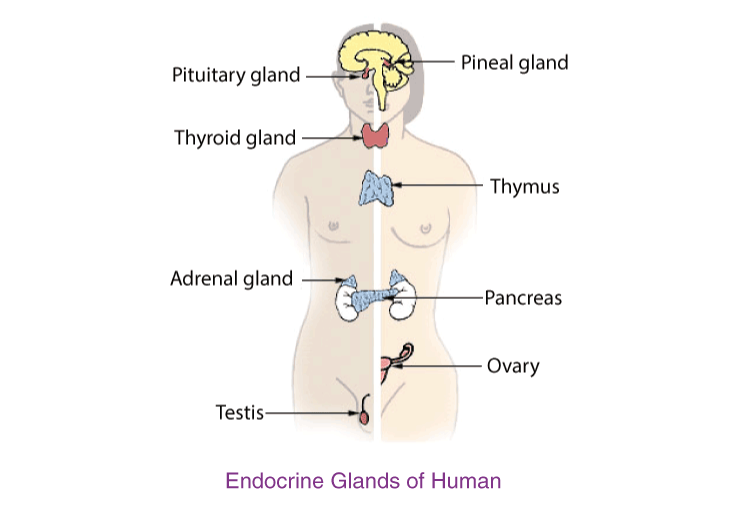
Menstrual Cycle
- It is a reproductive cycle of females.
- It begins at puberty, and the onset of the menstrual cycle is called ‘menarche’.
- The process includes cyclic changes in the ovaries and in the uterus, both simultaneously.
- In the ovaries, an ovum develops and matures and is then released.
- In the uterus, a thick spongy inner lining develops, anticipating pregnancy.
- If the egg is fertilized, pregnancy occurs.
- If fertilisation does not occur, the released egg and the thickened lining of the uterus, along with its blood vessels, are shed off.
- This causes bleeding in women, which is called menstruation.
- The menstrual cycle stops in women anywhere between 45 to 52 years, and the stage is called menopause
- The years between menarche and menopause mark the reproductive age of a woman when she is able to bear a child.
Sex Determination
- All human beings have 23 pairs of chromosomes in the nuclei of their cells.
- Two chromosomes out of these are the sex chromosomes, named X and Y.
- A female has two X chromosomes, while a male has one X and one Y chromosome.
- The gametes have only one set of chromosomes.
- The unfertilised ovum always has one X chromosome.
- But in the male gametes or sperms, there exists one kind having an X chromosome and the other kind having a Y chromosome.
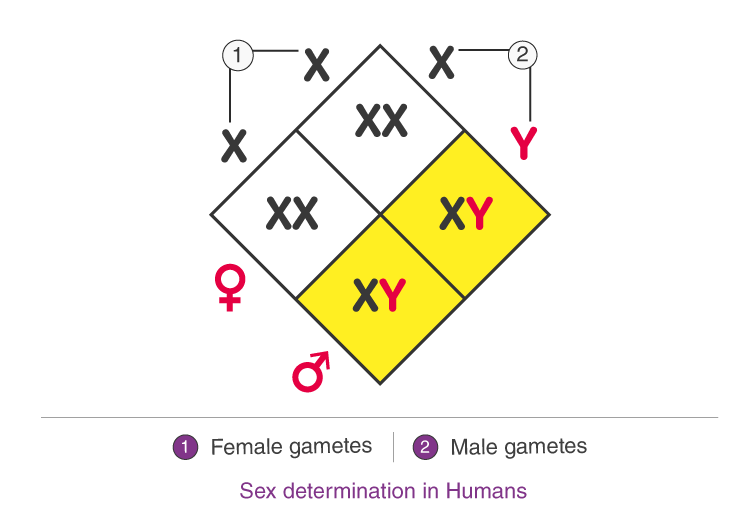
When a sperm containing X chromosome fuses with an egg, it develops into a female child.
When a sperm containing Y chromosome fuses with an egg, it develops into a male child.
No Crash Dieting
Personal hygiene
- Personal hygiene is very important, especially during the teenage years.
- Increased activity of sweat glands sometimes makes the body smelly.
- It also leads to acne.
- All parts of the body should be washed and cleaned every day.
- If cleanliness is not maintained, there are chances of catching bacterial and fungal infections.
Balanced diet
- Adolescence also equates to a sudden spurt in the growth of the body.
- A growing body requires all the nutrients.
- Therefore, all teenagers should consume a balanced diet and not junk food.
- A balanced diet is a meal that includes proteins, carbohydrates, fats and vitamins in proper proportions.
- Junk food affects the growth of an individual.
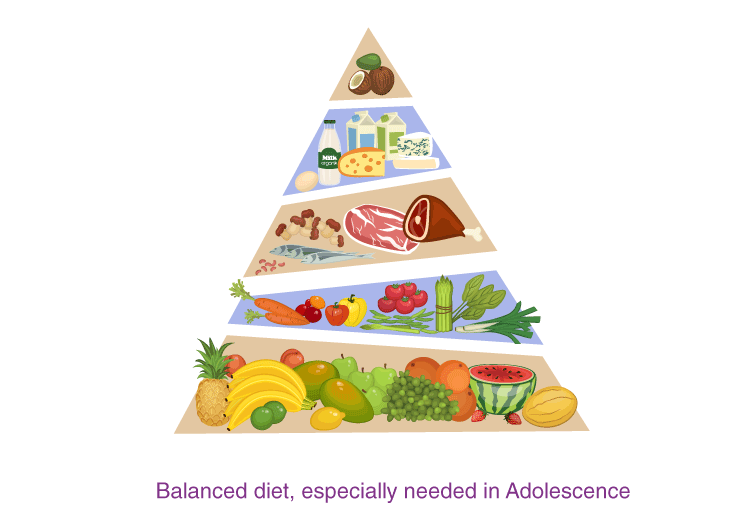
Physical exercise
- Exercise ensures a healthy body and mind.
- Walking, playing or practising yoga are some of the many ways we can carry out physical exercise.
Say NO to Drugs
- Drugs are addictive and harm the body in the long term.
- Sometimes harm done by drugs becomes irreversible.
- All teenagers should say ‘NO’ to drugs.



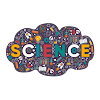


0 Comments